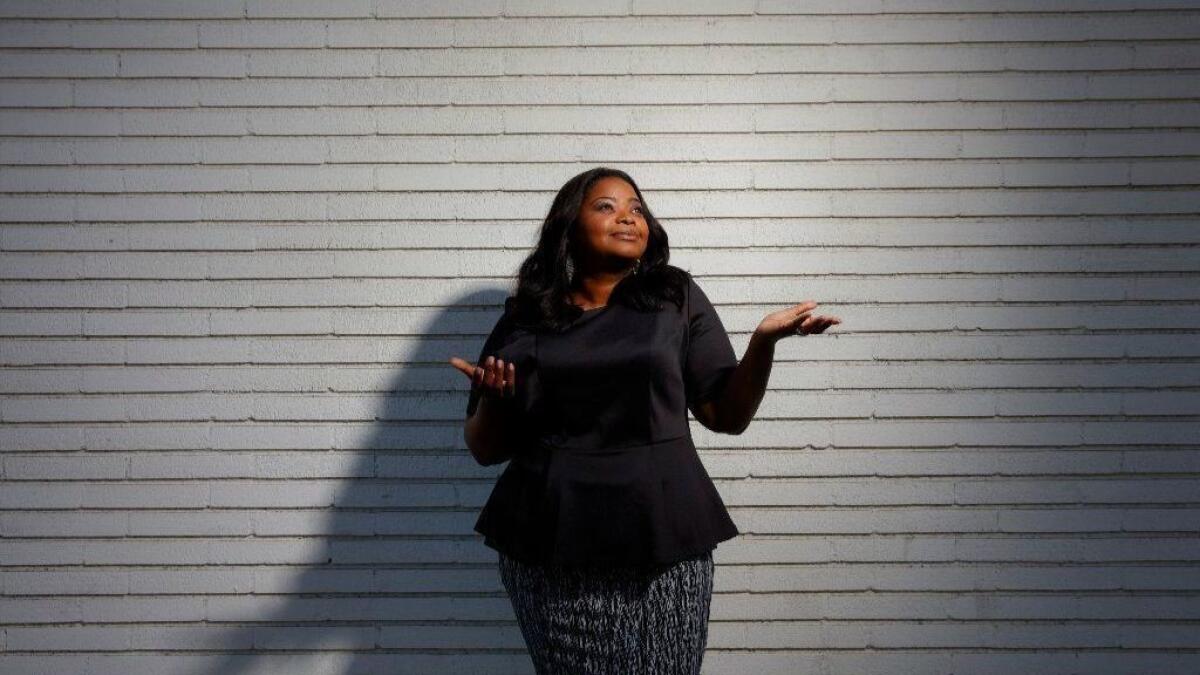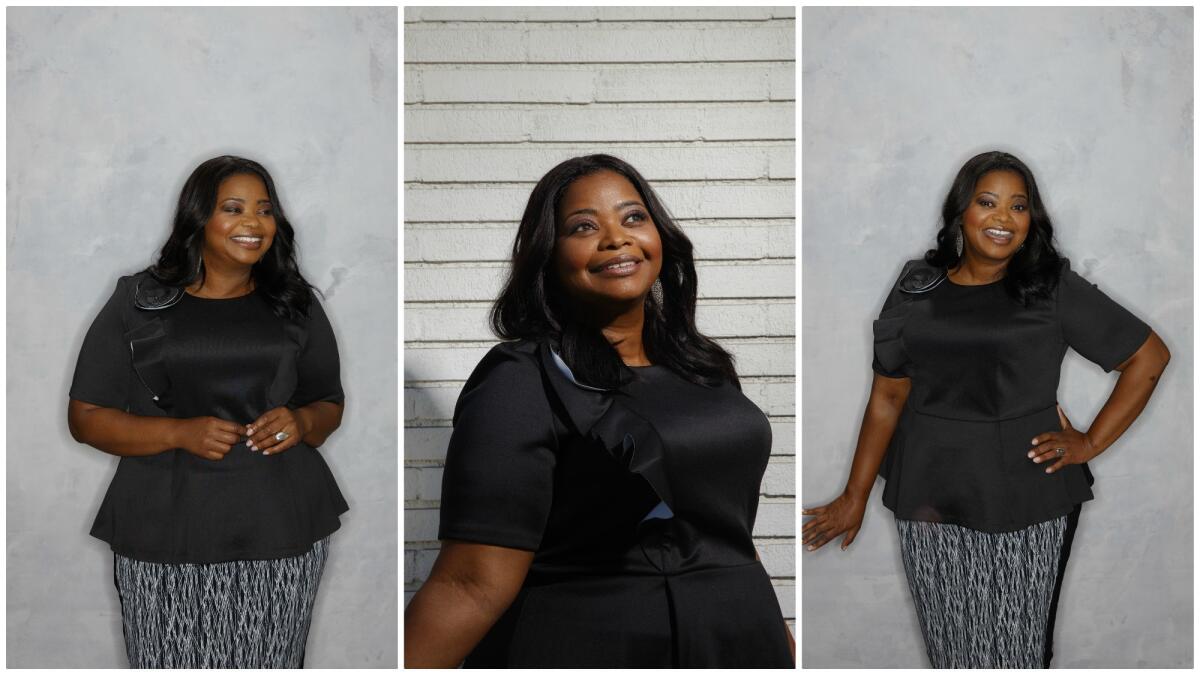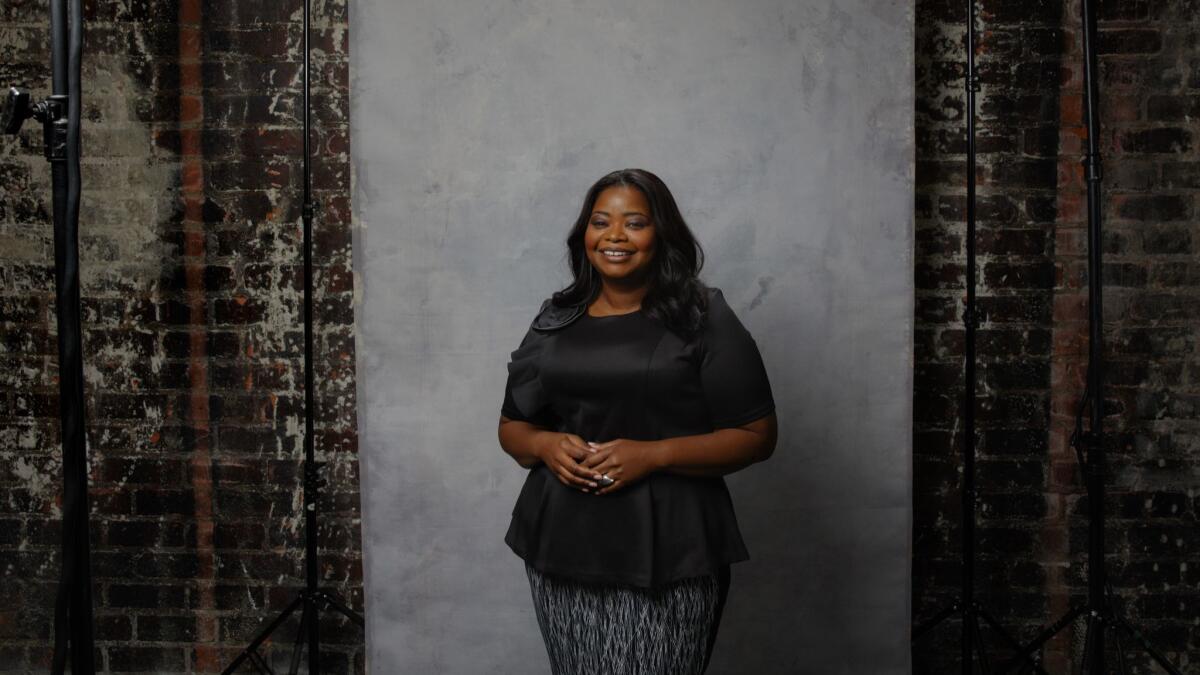Q&A: Whether she’s acting or producing, Octavia Spencer looks for one common element: A slice of life

Octavia Spencer is at the point in her career where she can be selective about work. An Oscar for her supporting role in 2011’s “The Help” — and nominations for 2016’s “Hidden Figures” and last year’s “The Shape of Water” — almost necessitates it.
But that doesn’t mean she’s chasing only awards-bait movies. Take, for example, her latest role in Sean Anders’ “Instant Family.” In theaters Nov. 16, the comedy follows Rose Byrne and Mark Wahlberg as a couple looking to adopt children. But they find themselves in over their heads when they welcome a trio of siblings into their home. Spencer shares most of her scenes with comedian Tig Notaro as a pair of adoption counselors who help the new parents find their way.
Ahead of the film’s premiere, The Times spoke with Spencer about the role and things she learned about the foster care system in preparation for the gig. She also talked about serving as a producer for one of the year’s most popular film festival offerings, “Green Book,” also in theaters Nov. 16, about a white bouncer who becomes the driver of a black pianist on a concert tour in 1960s America.
How are you choosing roles these days? What about “Instant Family” made you say yes?
It always depends on what that script says, because if it’s not on the page, there is little chance that you’re going to get any magic in front of the camera. The scripts have to be dynamic. And when I read this script, I just remember going through all of these emotions. I laughed and cried.
And the funny thing is, I had been toying with the idea of really trying to figure out if my life, right now, is conducive to bringing kids into it, making a home for kids. Then this project comes along and it’s, like, “Oh, Lord, what are you trying to tell me?” [laughs] It just touched me and resonated with me in a way that was very personal. And when I met with the director Sean Anders, who also co-wrote it, and found out it was based on his life — and that they actually lived a lot of the stuff in the script, all of that resonated with me.
FULL COVERAGE: 2018 Holiday movie preview »
What kind of prep did you do for the role? Did you speak to actual foster counselors?
Yeah, they definitely had counselors there at our disposal. I was in Mississippi when I found out that I was going to be doing this, filming a horror film with horrible phone reception and internet connection in a very remote place in Natchez. So a lot of my correspondence was via email. … But, there was so much about the system that I was unaware of.
Like what?
I did not realize that it’s such a hardship for teenagers to find families. And when you think about it, of course it is. Everybody falls in love with the cute little baby or the cute little toddler or the kid that’s just starting first grade. But teenagers need homes and love as well. And how many of them age out of the system when they are barely ready to be on their own and they basically comprise a huge number of the homeless population. That was heartbreaking for me to realize that.
But if it’s about life and introducing information and enlightening people in a way that they hadn’t been before, that’s usually what I gravitate toward.
— Octavia Spencer on finding film projects to work on.

One of the things I really enjoyed about the film was the dialogue was just so real. My favorite line that you say in the foster care group is, “I love seeing white people fight.” (laughing) And I was, like, “Me too! I really do.”
Well I credit everything to John [Morris] and Sean. I mean, all of the stuff, when Rose and Mark are in bed and they’re, like, “These kids are mean. We should just give them back and then, you know, just say it didn’t work out.” [laughs] It was really human. And they were able to laugh at themselves and realize, “You know what? This is hard but we love these kids. And they’ve made our lives better.” That’s what I love about it — that while it is a comedy, there are so many real elements and these are real emotions that we feel.
When you sit down with a script, you don’t go in thinking “I’m going to cry my eyes out in this comedy.” But you do, and I’m going to laugh hysterically at this comedy while reading it. Real life is not always laughing every minute. And real life certainly isn’t crying every two seconds. It’s a mixture of all of that. And that’s what I loved about it. It’s a feel-good, hopeful movie. And hopefully it will move more people into seeing if they have a place in their home for a child that needs love. That, at the end of the day, was one of the most beautiful things about it.
What was it about that story in “Green Book” that made you want to get involved as a producer?
I grew up in the South and all of this stuff preceded me, but I know it well. When I heard that they were doing a movie about the green book [a guide listing the hotels and businesses that served black people], I was kind of curious. I was asked to read the script to be a consulting producer, if I so wanted that role. And I read it and I thought, “Well, you have two very strong men as characters and as actors — both Viggo [Mortensen] and Mahershala [Ali] — and they were weighing in on the script and liked where things were going. So I felt like they did a great job in the research and, again, when you see it on the page — when it is apparent that the script has the capacity or the potential to move you in a way — you want to be a part of those types of stories, especially in these trying times.
And, sadly, some of the scenes that were represented in the ’60s are very much a part of what we’re living today. So I wanted to be a part of this movie for the social implications. Because if you have these two men from disparate backgrounds who are forced in a situation, one as an employee and one as an employer, to be with each other for an inordinate amount of time, they have to find a way to work with each other. They have to find a way to see each other as human beings, and that’s what happens.
I heard somewhere, “Is it another white savior movie?” And I had to laugh at that because there’s nothing white savior about it. It’s about two men saving each other. And that’s one of the things that I really valued, that Mahershala’s character Don Shirley does a lot to save and change Viggo’s character, Tony Lip, as much as it’s Tony’s job to save and protect Don Shirley. So there’s a lot of give and take, and a lot of learning that both of these men have to experience. And at the end of it, they grow.
Virtually every film coming out this holiday season »
The film has generated a lot of positive buzz on the festival circuit as a feel-good movie. Is it surprising to see the response that it’s gotten thus far?
[Director Peter Farrelly] had put together about 20 minutes of the movie [in advance], and I felt like I did when I watched “The Help” and when I watched “Hidden Figures” ... that sense of hope, that things can change, that people can work together and see each other as human beings. Pete has such a beautiful hand with levity, and I think sometimes that levity lends itself as a wonderful teaching tool. Because if you can laugh at a moment that is tense and scary and you don’t know what’s about to happen, the lesson that you learn from it will more than likely take, if it’s not confrontational.
There are moments when things have to be confrontational, because that’s life. And it should be confrontational because that’s truth. But there are other times when the audience gets a little relief from the “Oh, God, they’re driving through a sundown town. Oh, no.” When I’m watching anything and a police car pulls over a motorist that happens to be black, my stomach clenches. And it happened — even though I knew how it was going to end in “Hidden Figures” because I read the script and I participated in the scene, but, you know, you hold your breath. You hold your breath, even though you know that not every situation is going to end with violence … .
If you’re watching a movie and things in society that happen on a regular basis are somehow displayed on the screen and you tense up, because you feel like you know what’s going to happen, that means we have a lot of work in those areas. And that’s what I love about [“Green Book”]. Because it’s forcing us to have much-needed discourse about human relations.
Is there any difference in your approach to looking at projects to act in versus producing?
No, I don’t even look at roles, per se. I look at projects as a whole, because you could have an amazing script and a brand new director who’s only directed a two-minute short film and somebody’s given him millions of dollars and you’re supposed to trust that.
I look at all of the creative. I look at the script, first and foremost. And then I look at whether or not my role is significant enough or if it warrants me taking the role or if it should go to someone else who needs it or deserves that opportunity. They definitely have to be movies that I want to see, movies that will somehow have an impact. If it’s about pure escapism, then great. Sometimes you need to get away from your problems. But if it’s about life and introducing information and enlightening people in a way that they hadn’t been before, that’s usually what I gravitate toward.
Both of your fall projects are films with a message. What do you hope audiences will take away from them?
I try not to ever tell people what they should think. Because if I tell you to come in and tell you “this is what you should feel” and you don’t feel that, then you somehow feel negatively. I just want you to come in with an open mind and see what you feel, see if we can make you laugh, see if we can make you forget about your problems. Or see if we can make you see that, perhaps, you don’t see your neighbor as a human being and that you need to be better at that.

More to Read
Only good movies
Get the Indie Focus newsletter, Mark Olsen's weekly guide to the world of cinema.
You may occasionally receive promotional content from the Los Angeles Times.









